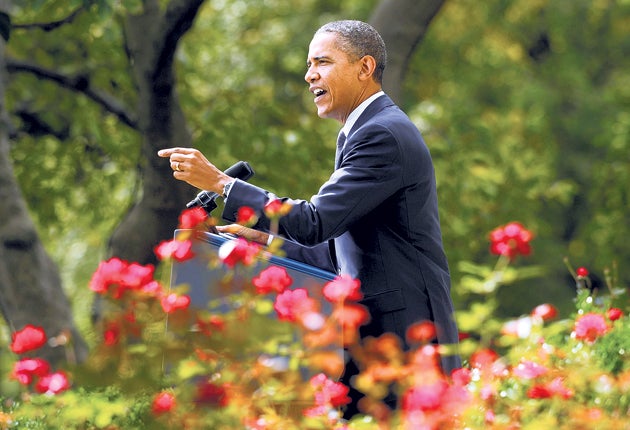Do the math, Obama tells Republican critics on tax
President's proposals to reduce budget deficit earn an immediate rebuke from opposition on Capitol Hill

A determined President Barack Obama demanded yesterday that the way forward to scaling back America's yawning budget deficit must include tax increases for corporations and the wealthy, in a Rose Garden address that earned him an instant and stinging rebuke from Republican leaders on Capitol Hill.
Painting himself as the defender of the middle classes and the elderly, Mr Obama rejected criticism voiced at the weekend by some Republicans that by insisting on combining tax increases with cuts in spending to tackle the deficit, he was embarking on "class warfare" in America. "It's not class warfare, it's math," he retorted yesterday.
The new tone from Mr Obama means that Washington is entering another period of fierce combat as a bipartisan super-committee established before the summer holidays begins searching for the right formula to help close the budget gap over the next decade. He notably vowed to veto any proposals that include cuts in state programmes for the poor and the elderly, and do not include changes in tax rates.
Criticised in the past for letting Congress take the initiative on crafting policy, this time Mr Obama has gone on the offensive early. His speech was part an unveiling of a package of steps that he would like the super-committee to adopt. It promises to deliver an additional $3 trillion in savings by introducing cuts in an array of areas, including farm subsidies and the winding down of overseas wars, as well as by increasing revenues with the tax changes.
The first response from his foes did not bode well for compromise. "Veto threats, a massive tax hike, phantom savings, and punting on entitlement reform is not a recipe for economic or job growth – or even meaningful deficit reduction," said Mitch McConnell, the Republican leader in the US Senate, within minutes of Mr Obama's speech.
The White House believes, however, that it may be able to drive the Republicans into a politically uncomfortable corner with most polls suggesting that a majority of Americans are with the President in believing that some tax rate changes should be part of any solution.
Mr Obama's pitch as the defender of the middle classes will become the cornerstone of his re-election effort in the months ahead. "I will not support any plan that puts all the burden on closing our deficit on ordinary Americans," he said. "We are not going to have a one-sided deal that hurts the folks who are most vulnerable."
The Treasury Secretary, Tim Geithner, went directly to the microphones to give his personal backing to the President's approach and to reject the arguments from the other side of the aisle that any tax increase will slow the engines of recovery. He said that the "modest changes in tax rates we are proposing will make the economy stronger in the long term, not weaker in the long term".
The Obama package includes a so-called "Buffett provision", named after the billionaire investor Warren Buffett, to increase tax rates for US millionaires and billionaires. Mr Buffett has himself lamented that the current tax code allows people like himself to pay a lower rate of tax than middle-income earners, including his own secretary.
"We can't just cut our way out of this hole," the President said. He noted that he is among the millionaires who should face higher tax rates than the middle classes, adding: "It's only right we ask everyone to pay their fair share."
Mr Obama also made clear that he will not extend for a second time tax rate cuts for the rich enacted by his predecessor, George Bush.
With Republicans in control of the House of Representatives, there is scant chance that Mr Obama's package will survive in its present form. At the same time, however, the super-committee begins its work knowing that if it fails to reach a deal by Christmas a swingeing series of cuts, including in defence spending, will automatically come into force. The Republicans may also be forced to accept some kind of compromise with the President on taxation if they calculate that not doing so will be cost them politically.
Mr Obama notably did not propose an increase in the eligibility age for Medicare, the medical insurance programme for older Americans, which is something he has dabbled with in the past. His speech in that regard seemed crafted more with a view to pleasing his Democrat base as he prepares for the 2012 elections than clearing a path to compromise on Capitol Hill.
How Americans are taxed
* Despite Barack Obama's promise to increase taxes for the rich yesterday, and his assurances that loopholes will be closed, Americans are still likely to be among the most lightly taxed in the western world.
Indeed, compared to British income tax-payers, Americans are much better off. The highest rate in the US is 35 per cent, on incomes of more than $379,151 (about £242,000) – a proportion that has fallen from post-war highs of 92 per cent. Those earning an average salary of $50,233 pay a top rate of 25 per cent.
Of course, Americans are also liable to pay state income taxes, which varies from a high of 5 per cent in Utah to nothing at all in a number of states, including Alaska and Florida.
Join our commenting forum
Join thought-provoking conversations, follow other Independent readers and see their replies
Comments